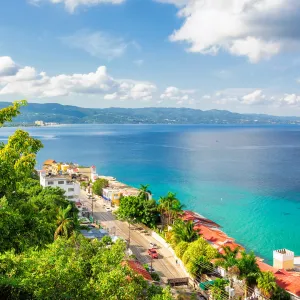October 10, 2010
The Caribbean Sea formed my first impression of Jamaica on a recent trip. The approach to the single runway at Sanger airport in Montego Bay is over the water. As the land emerges from the deep and makes a run-up to the beach, sugar-white sand frames the clear, blue water that splashes miles of shoreline with bright, turquoise paint. The narrow beach weathers few waves and quickly gives way to deep-green, tropical flora that blankets and climbs the steep hillsides. Palms sway in the gentle breeze, and the lush greenery is only interrupted by the occasional home—mostly colored in pleasing pastels—planted firmly into the rock-like marshmallows on the side of a lime Jell-O mold.
My first impression was that Jamaica is a bejeweled, enchanted island paradise. It must have seemed so to Christopher Columbus when he voyaged there in 1494, although the spot where he is to have landed, Discovery Bay, is now dominated by a huge, rusting bauxite plant. Claimed by the Spanish, who were later expelled by the British, Jamaica became a leading sugar producer manned by imported African slaves, then, when slavery was abolished, Indian and Chinese indentured servants. Although still a British Commonwealth realm, Jamaica became independent in 1962. Today sugar, rum, and tourism provide most of the island’s economy.
The two-hour drive from Montego Bay to our destination, Ocho Rios, once a white-knuckle amusement park ride, was made pleasant by a new, modern ribbon of highway and a tour guide who doubled as a driver, peppering his travelogue with frequent horn toots. To the Jamaican, driving on the wrong side of the road (their correct, our left), the horn is both a signal and greeting. We passed many small huts advertising Jamaica’s most famous food, jerk chicken, a mildly spicy and delicious meal.
It did not take long to observe the obvious divide between the ordinary citizenry and the wealthy tourist. Sprawling, grand resorts like Sandals and the Ritz Carlton were pointed out with pride. So were the ubiquitous half-finished Jamaican homes, cinder block lower stories sprouting rebar like a cane field. “Yeah, Mon,” said our guide in his heavily accented but precise English, “Jamaica’s economy is not very good, and the banks charge exorbitant interest rates. So we build our homes as we can afford them, with cash. When a section is finished, we live in it and save to keep building.” Jamaicans, unlike Americans, are not in a hurry.
The Jamaican people we met and those we encountered in our touristy activities were delightful. They are striking people, but what impresses is the instant flashing smile and a genuine aim to please. “No problem, Mon” is more than just a colloquialism; it is an attitude. It is true that the poor vendors in the local marketplace are very pushy, but they understand what “No thank you” means. Yet, one cannot help thinking to replace what one self-proclaimed Rasta-man (Rastafarian adherent) tour guide claimed was Jamaica’s number one money-maker, marijuana (widely used although illegal), with some good old-fashioned American work ethic couldn’t hurt the economy. Still, most locals seemed industrious and busy.
There is no doubt the pace in Jamaica is slower than our frenetic rat race. Relaxing in a tropical paradise is alluring. I took my watch off and, even though it rained during much of our stay, cast off my cares and said, “Yeah, Mon. No problem.” Having said all of that, my family and I were very happy to arrive back in the good old USA and thanked to God for allowing us to be born in this richest, freest nation on earth.





